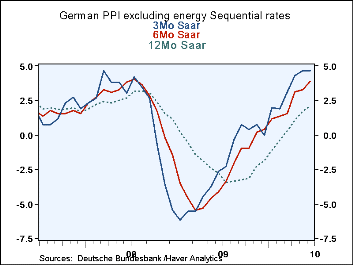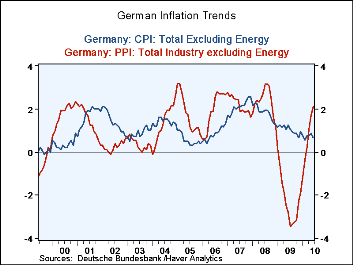 Global| Jul 20 2010
Global| Jul 20 2010PPI Pressures Continue To Rise In Germany: Do We Care?
Summary
Off to the races - The German PPI excluding energy continues to show an escalating pace of inflation for each horizon and the patterns shows that acceleration is still the order of the day. Prices are advancing faster over three [...]
Off to the races - The German PPI excluding energy continues to show an escalating pace of inflation for each horizon and the patterns shows that acceleration is still the order of the day. Prices are advancing faster over three months than over six months and faster in six months than over 12-months. It has been that way with one minor exception since the turn of the year.
Acceleration! - In June the overall PPI excluding the construction sector jumped by 0.5%. Over the past three months it is up by 0.5% 0.1% and 0.7%. This amounts to an annual rate of 5.3%. It's the same as the pace over three months and a marked acceleration from the 1.7% Yr/Yr rise in the index. In the just-concluded quarter, the PPI is rising at a slightly stronger 5.4% annual rate.
ExcedrinTM headache number 2010? Clearly PPI trends offer little solace to the Bundesbank or to the ECB.
Mars Vs Venus - But the PPI is not the preferred inflation barometer in Germany or in the Euro-Area. The chart above shows that PPI inflation bears a weak correlation with the CPI even when the volatile energy sector is stripped out of both of the series. The PPI bears no consistent relationship to the CPI in terms of the various inflation cycles either. In 2001 the Ex energy PPI peaked first. In the 2004 inflation cycle it peaked second. In the current cycle it made a double peak around the peaking of the ex energy CPI. Currently, while the ex energy CPI in Germany is on a steady decline in its Yr/Yr rate of change, the PPI has plunged and now on a new path that is ratcheting higher.
What policymakers watch Vs what they fear - The PPI is not really a gauge to worry about if you are trying to get one-step ahead of the policymakers. Of course, the Germans have a special inflation phobia and so even an unreliable gauge is likely to give them goose bumps even when they do not focus on it if it is going haywire. The policymakers might set it aside but they will still be watching it closely. In the case of Germany it hates inflation and always tries to keep it low with undesirable trends bay. Even when a less reliable index begins to inflate that gets some consideration. But in the main the Germans do look at the HICP and so does the ECB. For now the rising PPI is a nuisance. Let's hope it stays that way- or better yet - diminishes. In fact that course seems the more likely one with growth indicators slowing and commodity prices off peak and the ex energy CPI trending lower.
| Germany PPI | ||||||||
|---|---|---|---|---|---|---|---|---|
| %M/M | %-SAAR | |||||||
| Jun-10 | May-10 | Apr-10 | 3-mo | 6-mo | 12-mo | 12-moY-Ago | IN Q2 | |
| PPIxConst | 0.5% | 0.1% | 0.7% | 5.3% | 5.3% | 1.7% | -3.0% | 5.4% |
| Ex Energy | 0.2% | 0.5% | 0.5% | 4.7% | 3.9% | 2.1% | -2.8% | 4.5% |
Robert Brusca
AuthorMore in Author Profile »Robert A. Brusca is Chief Economist of Fact and Opinion Economics, a consulting firm he founded in Manhattan. He has been an economist on Wall Street for over 25 years. He has visited central banking and large institutional clients in over 30 countries in his career as an economist. Mr. Brusca was a Divisional Research Chief at the Federal Reserve Bank of NY (Chief of the International Financial markets Division), a Fed Watcher at Irving Trust and Chief Economist at Nikko Securities International. He is widely quoted and appears in various media. Mr. Brusca holds an MA and Ph.D. in economics from Michigan State University and a BA in Economics from the University of Michigan. His research pursues his strong interests in non aligned policy economics as well as international economics. FAO Economics’ research targets investors to assist them in making better investment decisions in stocks, bonds and in a variety of international assets. The company does not manage money and has no conflicts in giving economic advice.
More Economy in Brief
 Global| Feb 05 2026
Global| Feb 05 2026Charts of the Week: Balanced Policy, Resilient Data and AI Narratives
by:Andrew Cates








